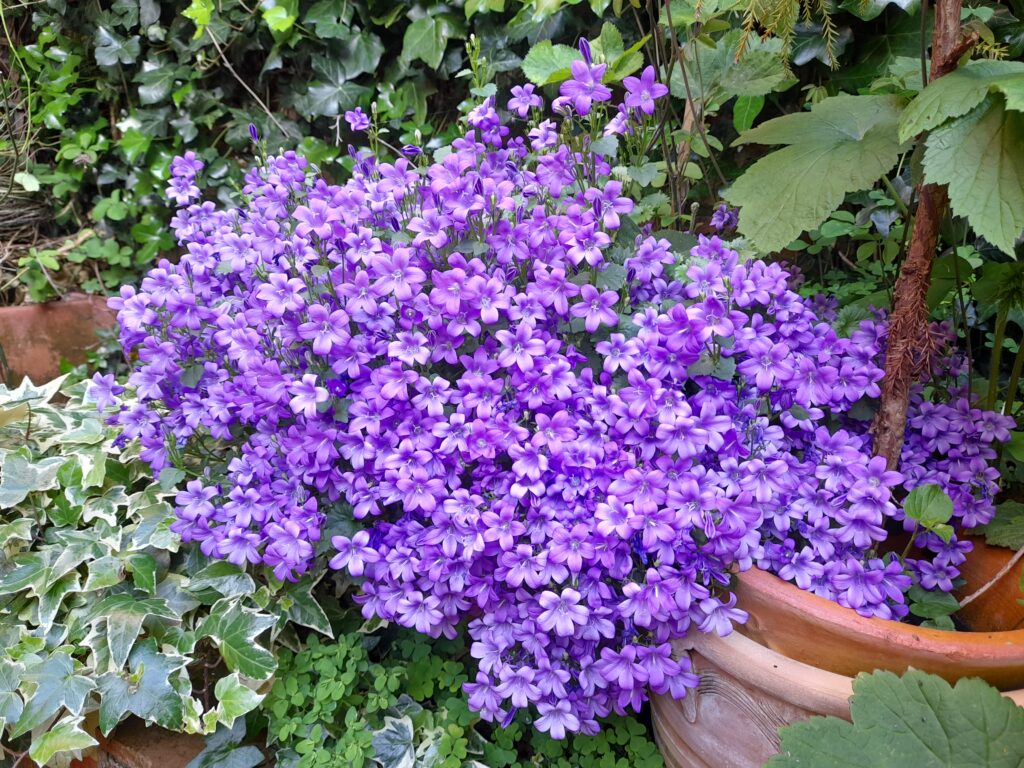

Venerable Canda features in this fourth episode of the ongoing series, “Love Letters to Myanmar.” by Insight Myanmar Podcast
Listen to the podcast here.
“Reflecting now on everything she received in her spiritual life from Burmese teachers and the wider monastic and lay community, Venerable Canda feels that now is very much the time to give back. Towards this end, she reminds practitioners: “I do believe we have to learn how to bring our practice on the cushion into every aspect of our life.”
To this end, if you wish to support their work in Burma/Myanmar, you can find details for donating by following the link here or by using the QR code below.
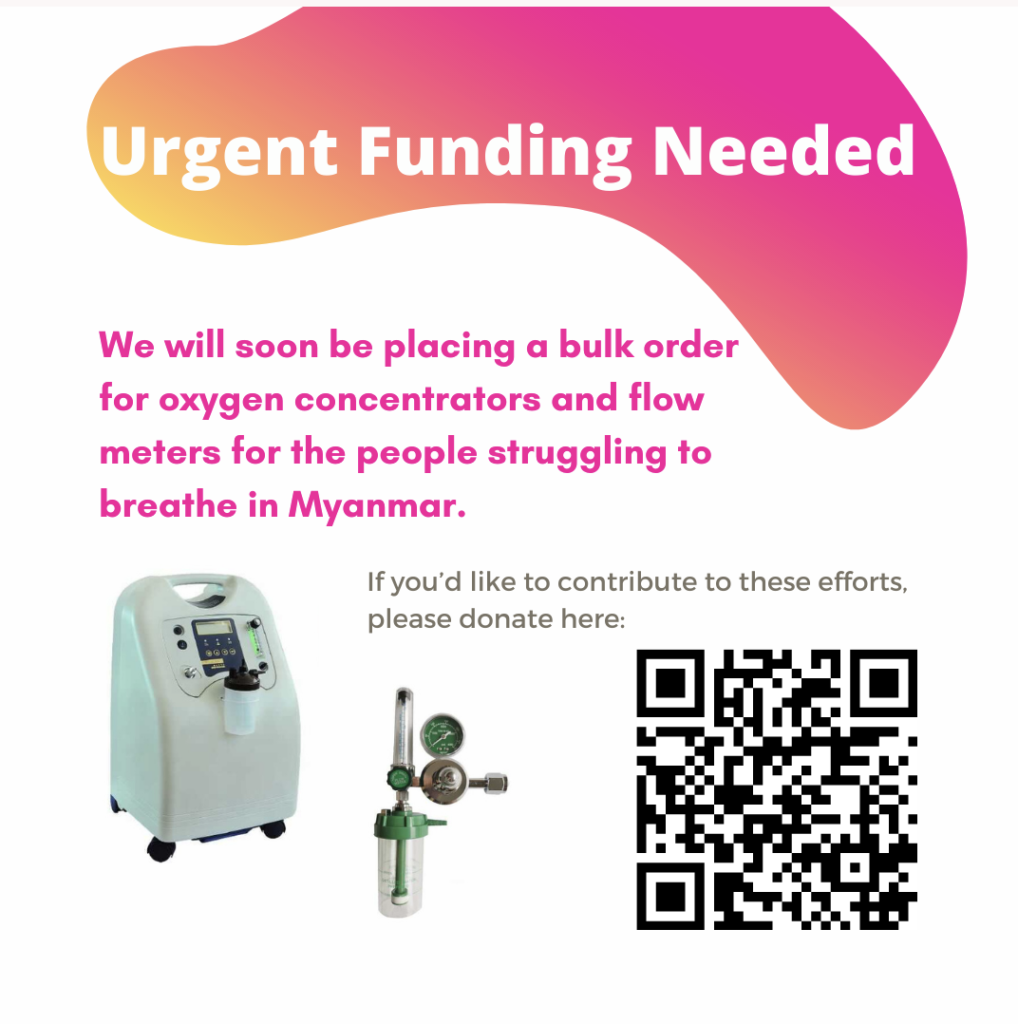
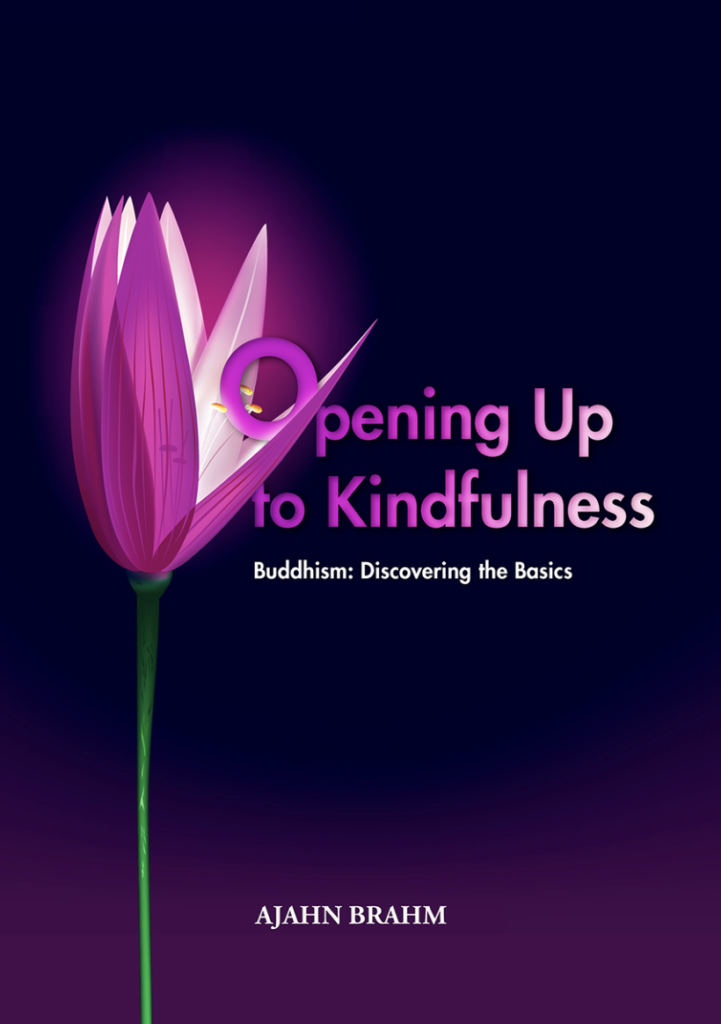
Foreword by Ajahn Brahmali
Mindfulness, shmindfulness. It’s everywhere. In many countries, large parts of the population have been exposed to this fashionable trend, sometimes to the point of weariness. More to the point, while the benefits of mindfulness have been publicised with much fanfare, are we really getting it right? Or could it be that we are missing out on the full potential of this ancient Buddhist practice?
The mindfulness movement has its roots in Buddhism. Early advocates used the ancient Buddhist idea to establish their own brand of mindfulness. In effect, they extracted one aspect of the Buddhist teachings, repackaged it using modern terminology, mixed it with contemporary psychology, and sold it as a tool to enhance emotional well-being and cognitive abilities. To make it more palatable to general society, they deliberately downplayed the connection to Buddhism.
There are serious downsides to this approach. Perhaps the most important of these is the loss of the context in which mindfulness appears in Buddhism. In Buddhism, mindfulness is just one factor among many that lead to enhanced well-being. In fact, mindfulness is not independent of the other aspects of mind but is founded on other more basic qualities. It is these qualities that give mindfulness its stability and power. Without them, mindfulness has a very limited effect.
Enter Ajahn Brahm. Sometimes it takes someone special to point out the obvious. Drawing on the Buddhist suttas—the word of the Buddha—he has pointed out that true mindfulness is always based on morality. Moreover, Buddhist morality is not just a negative morality of avoiding what is bad, but a specific positive morality of doing good. Only a good-hearted person will enjoy truly strong and potentially life-changing mindfulness. And by developing the good qualities of the heart, mindfulness will continuously improve.
Yet the true genius of a powerful spiritual teacher is to come up with new ways of expressing ancient wisdom. The word kindfulness combines a deep appreciation of the working of the Dharma with a playful imagination, both of which are hallmarks of Ajahn Brahm’s approach to Buddhism. Through profound understanding and light-hearted delivery, he imparts these life-changing teachings in an attractive manner to the world at large. Fun and wisdom, wisdom and fun. They always go together. And they are beautifully encapsulated in that innovative word: Kindfulness.
Happy birthday, Ajahn! For reasons not entirely selfless, we wish you many more years as a creative, inspirational, and wise Dharma teacher.
With the greatest respect and appreciation,
Ajahn Brahmali 1 July 2021
Download the full book here:
Latest Steps Toward Britain’s First Bhikkhuni Monastery!
By Venerable Canda Bhikkhuni, June 2021
The coronavirus pandemic has widened our eyes to the fragility and uncertainty of existence. Being subject to birth, old age, sickness, and death also means being vulnerable to the disappointment and even despair of having all our plans shattered, re-made, and then shattered again. This obvious lack of control can be scary and confronting, yet if we learn to surrender to each moment with an open heart, we may find new opportunities in disguise! “Ajahn Corona” (as Ajahn Brahm dubbed it), presented tough challenges, yet also brought unexpected blessings for Anukampa’s monastery project.
My initial concern was that prolonged lockdown, and the consequent absence of guests would bring progress to a standstill. I had to get creative in finding new ways to serve and build community. Over a year later I am delighted to say that we have not lost momentum but have made considerable steps to further both our charitable aims!
Aim 1: to promote the teachings and practices of Early Buddhism, leading to full Awakening.
Moving our teachings online brought wider international exposure to Anukampa yet more intimacy to our community. It humbles me that during tremendous physical and emotional turmoil, people had the courage to turn inward toward suffering. I received letters describing the teachings and community, as a lifeline ~ offering hope, comfort, wisdom and even joy ~ throughout times of overwhelm, loneliness and grief. I have been inspired to see people renew their commitment to and deepen their meditation practice, and as result my own confidence in Dhamma has increased. Sometimes, when our backs are against the metaphorical wall, we discover where our true refuge lies.
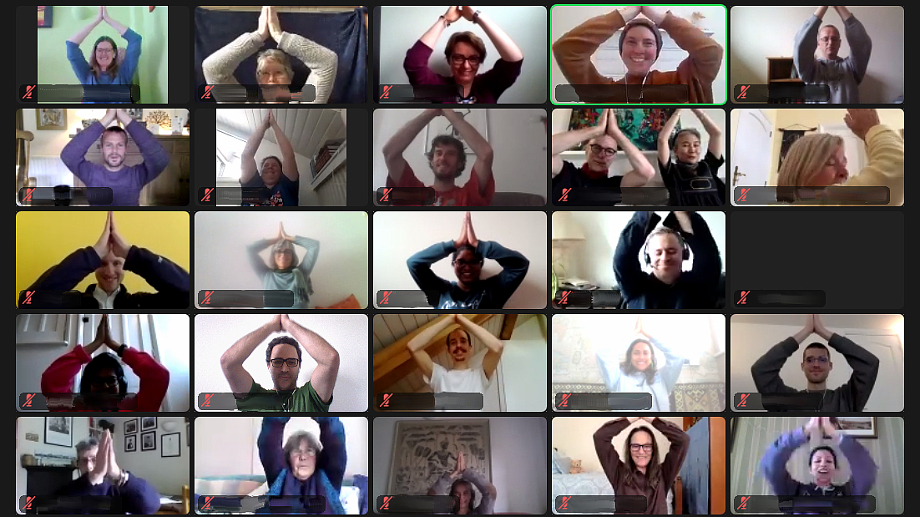
Aim 2: to establish the first “Forest Monastery” in England where women can train towards full bhikkhuni ordination.
Now, there are three main areas we need to focus on, to grow deeper roots:
1. Project management/ admin help
2. Monastery caretakers and local support
3. Finances
1. Project management/ admin help: Another wonderful result of our online teachings has been the emergence of new volunteers and project management help. Yvonne generously offered her mentoring as a gift, and we hired part-time professional admin help to lessen my load and free me up to eventually take on monastic aspirants. We welcome any donations towards our monthly admin costs. We would also love to hear from you if you would like to join our growing volunteer team: team@anukampaproject.org
2. Monastery caretakers and local support: Building a monastic Sangha depends on having committed lay residents with an established Dhamma practice interested to live in community and support the Sangha’s daily needs. Such people are rare gems; however, there may be local support in Stroud. Stroud is a small town in the Cotswolds and one of our short-listed areas for a future “Forest Monastery,” so this is extremely exciting news! We recently formed a property search committee tasked with finding accommodation in the vicinity, with a view to move in November after the annual monastic “rains’ retreat” (vasssa). We will initially be looking at rental properties, so we can further assess the suitability of the area, but do not rule out purchasing if the right place appears.
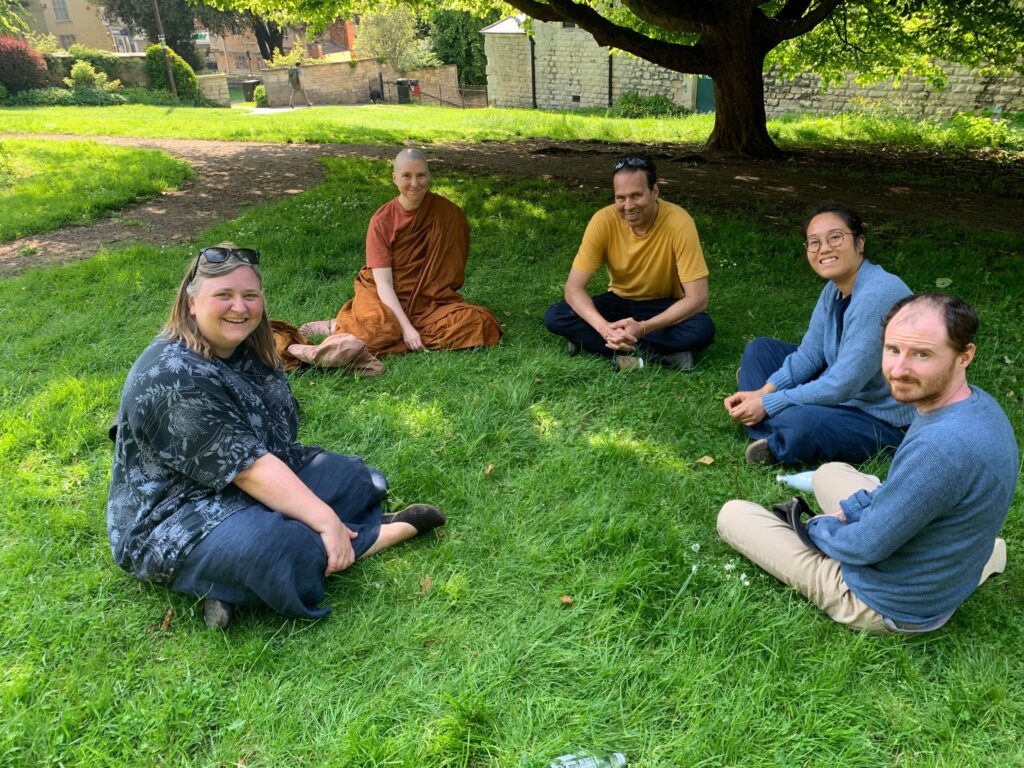
3. Finances: The combined generosity of international supporters throughout the pandemic enabled us to meet the rental costs of our temporary Vihara (Bhikkhuni Residence) in Oxford and even build on our savings. This suggests that the outgoings of a permanent monastery may be within reach! Our trustees estimate that we are two-thirds of the way to affording a suitable place. As an independent charity with no financial backing from any other Buddhist organisation this is all thanks to people, perhaps like you, who come to our events and contribute in any way you can. We feel extremely encouraged by your support as it shows you benefit from our offerings and believe in our aims.
How Can I Be Involved?
Anukampa now need to build on their savings and would love to hear from you if you have ideas for any fund-raising initiatives (write to team@anukampaproject.org). The charity continues to welcome regular standing orders and donations of any amount and every contribution is deeply appreciated. Ven Canda is currently on retreat, but please visit www.anukampaproject.org/events for Anukampa’s summer schedule with guest bhikkhunis Ayya Anandabodhi and Ayya Cittananda, as well as peer led Dhamma events. In December, Ajahn Brahm and Ven Canda are teaching a 7-day online retreat to help further Anukampa’s aims that you are welcome to join if your time-zone allows!
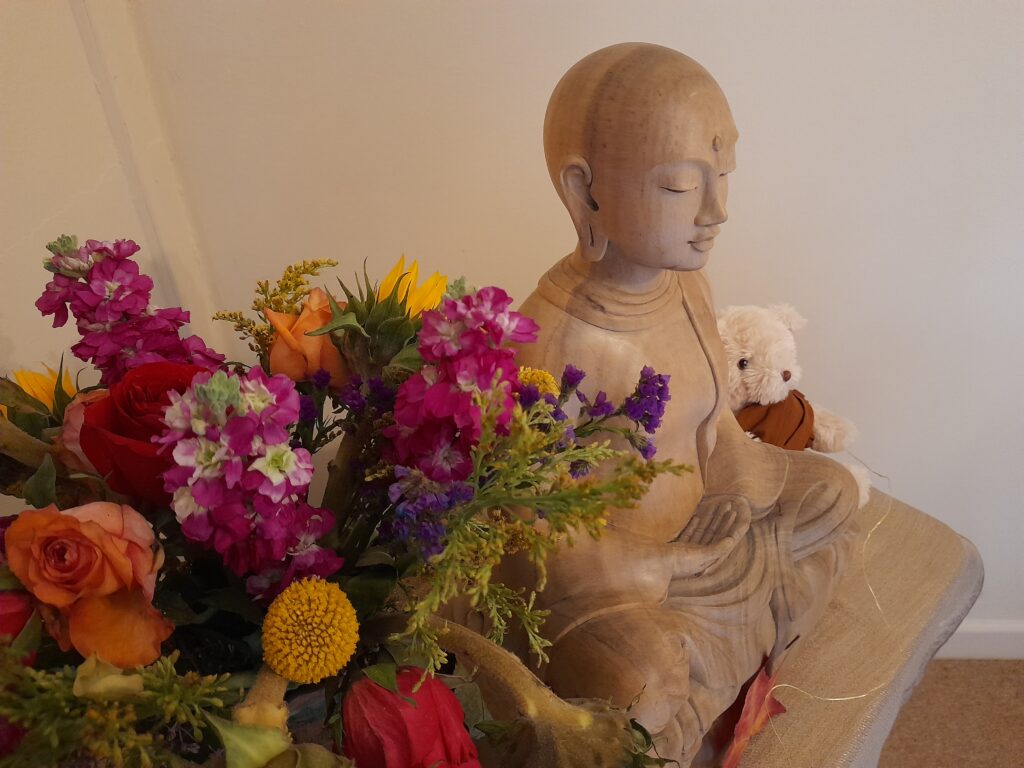
Just over two weeks ago, we relinquished our lovely little rented Bhikkhuni Vihara to her new owners. When the 4-bed Victorian terrace previously went up for sale, our charity considered buying it, but decided to hold out until we are in a practical and financial position to find something bigger. Thankfully, around the same time and due to covid, the owner delayed the sale and we were able to extend our contract for another year. During the two and a half blessed years I lived on Jeune Street, we operated both as a mini urban monastery ~ hosting guests from Europe and as far afield as Hawaii and Singapore ~ and as an online Dhamma dispensary, serving hundreds of people from around the globe. From the first UK lockdown in March 2020, our lovely dwelling became the birthplace of “Zoomi Bhikkhuni” and filled up no longer with guests, but with the inspired energy of Dhamma service, giving rich meaning and purpose to the solitude that I more often enjoyed than endured! Behind the scenes I put long hours into developing the project and our wonderful volunteer teams, and with the help of many, including my Revered Teacher Ajahn Brahm, we were able to offer a regular teaching programme to support one another, during various stages of lockdown.
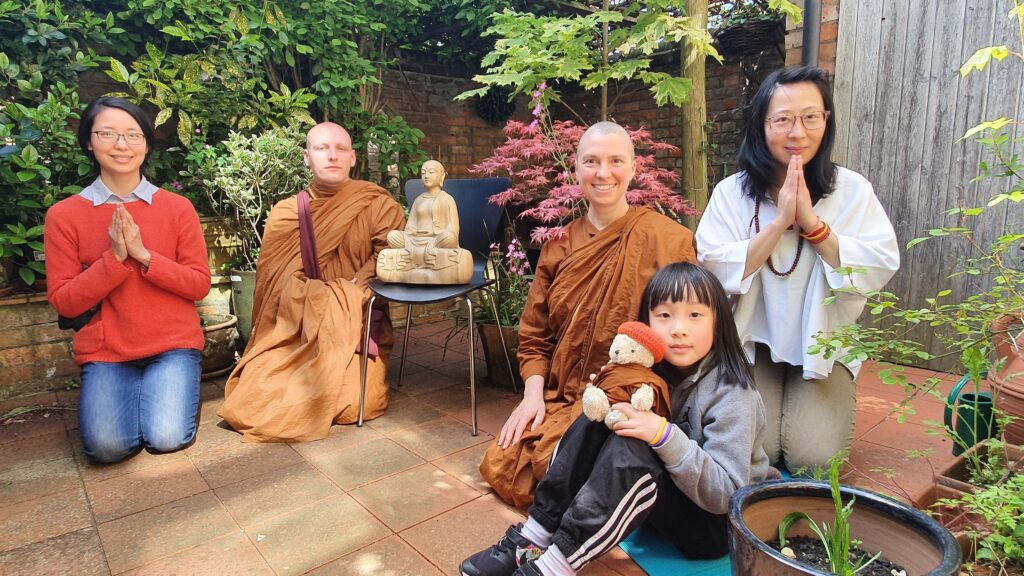
It was also in Oxford that I spent my very first bhikkhuni vassa (rains’ retreat) in the UK, last year. This was my 15th vassa as a nun and 7th as a bhikkhuni, (owing to the eight years I spent previously in Myanmar and Australia as a samaneri (novice), before I was able to find an opportunity to take bhikkhuni ordination ~ not an uncommon trajectory for a female monastic!). To the best of my knowledge, this was also the first vassa any Theravada bhikkhuni had spent in the UK, in a fit for purpose bhikkhuni dwelling! That 3-month retreat period was one of deep gratitude, contentment and peace, made possible only by the generosity of hundreds of known and unknown people who offered their practical and moral support.
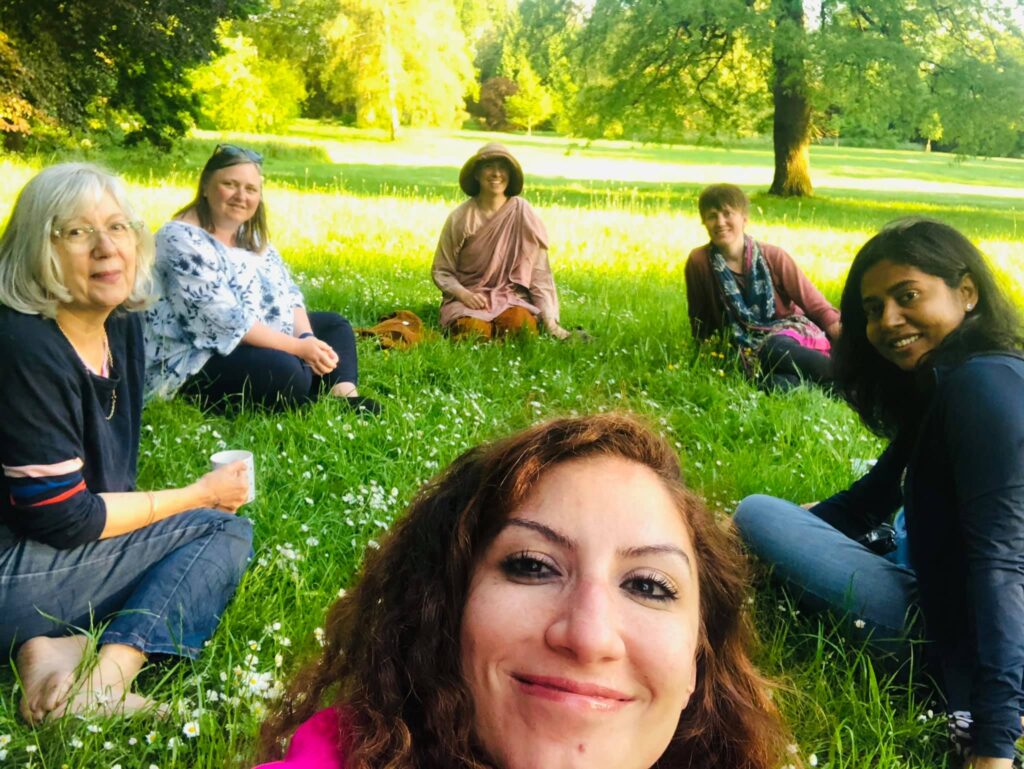
Whilst I feel some sadness that Britain’s first Bhikkhuni Residence is no more, I am satisfied and grateful for all we have accomplished together so far. Our monastery vision is alive and gaining momentum, and I am highly optimistic that our warm-hearted community will continue to grow and meet our aims. But for now, it is time for retreat!
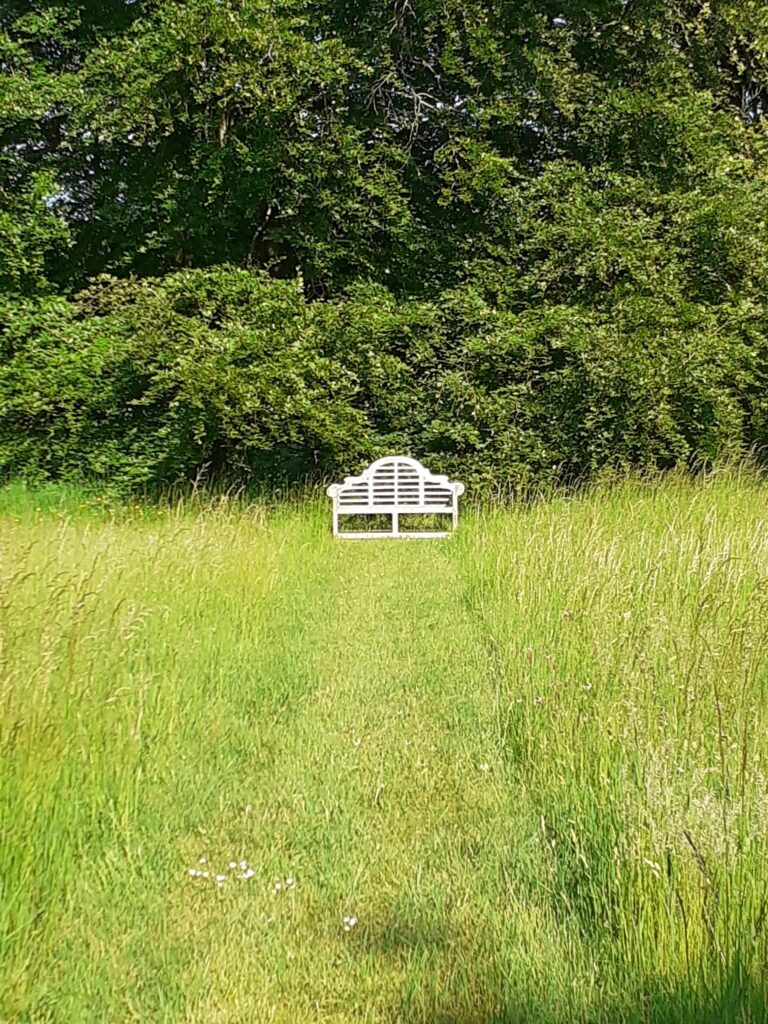
I am pleasantly surprised by the remote and pretty location of our rented retreat cottage in rural Wiltshire, which is excellent for quiet meditation. As I gradually settle in and become oriented to the change, I can feel my body and mind relaxing and slowing down. There were a few teething problems ~ the first Tesco delivery driver got lost, only to arrive 4 hours and 38 emails later at 10pm! ~ but those problems seem to be solved! There is barely any mobile signal, but internet is working well, so my Skype interviews with Ajahn Brahm can proceed, and I am breathing many a sigh of relief and delight to turn inward.

Before I fully disappear with your blessings, I wish to express heartfelt gratitude to all our wonderful friends and supporters whose confidence in our project – and in me – spurs me on; and to all those who have contributed ~ and continue to contribute ~ in big and small ways towards developing a peaceful and welcoming “Forest Monastery,” where women will have the opportunity to renounce and live the Holy Life proclaimed by the Buddha in its fullness, perfect and pure.
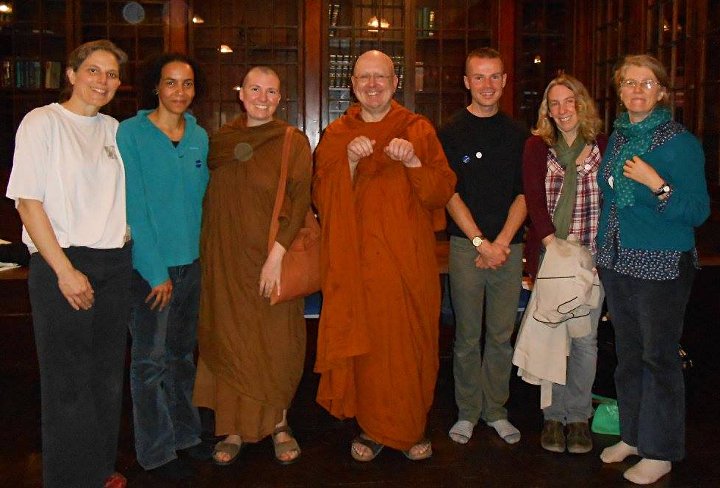
May all beings end suffering and realise Nibbana, with minimum hassle and maximum bliss! May every step we take on this glorious Path be motivated by the compassionate intention to benefit all beings, including ourselves. May we all continue to find the encouragement, inspiration and strength to gently meet, understand and finally end suffering and along the way become beacons of light, hope and direction to others.
If you wish to support Anukampa during this time, you can make a monthly, or a one-off donation of any amount here: www.anukampaproject.org/donate. There is a programme of events during my retreat period, with guest teachers Ayya Anandabodhi Bhikkhuni and Ayya Cittananda as well as peer-led groups, see www.anukampaproject.org/events. Our property search committee continue to work towards finding a permanent base ~ and don’t forget to sign up for our online December retreat with Ajahn Brahm and I!
New Year Retreat 2020, for Sheffield Insight
I hope you had a nice lunch; nutritious, delicious, and warm.
Somebody just mentioned in the chat box to me privately, that during the break they read in Bhikkhu Bodhi’s book – it would be a translation of the Therigatha (verses of the Enlightened Bhikkhunis – that there was a Venerable Canda in the Buddha’s day and she wrote a verse in honour of Venerable Patacara. Ven Patacara was the teacher of Ven Canda in the Buddha’s day.
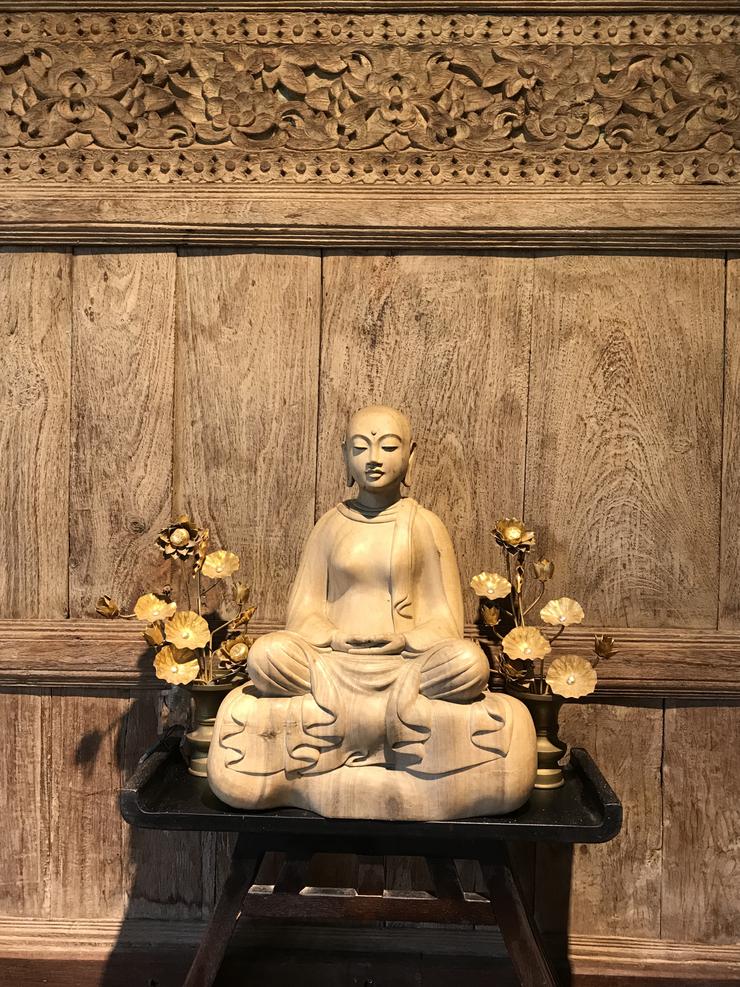
Ven Patacara had a lot of bhikkhuni disciples and at least 500 women were enlightened under her. Ven Canda was a lady who went forth in later life. She was extremely poor, had had quite a difficult life and was wondering around as a recluse but not yet as a nun, trying to seek the truth but not knowing where to look. She came across the venerable Patacara and gained great confidence in her. As a result she became her disciple and also became enlightened. So, there you go, maybe it is a good sign that I’m named after her and that now we now have Ven Patacara’s statue here to inspire! Certainly, she has a lot of serenity and she has overcome a lot more suffering than me.
It is great to have this heritage from the Bhikkhuni Sangha; to have it preserved in the Therigatha and there are various translations of that. I was saying to River earlier because she was wondering whether to read out some of those poems, that there are different translations. Some are more poetically licensed, and others are closer to the actual words that those bhikkhunis spoke. Different things speak to different people, but I really suggest checking it out, if you can maybe go to Sutta Central. There are a few different translations on there of the Therigatha. The bhikkhunis give inspired utterances after their Awakening and they tell their story about what led to that, and the struggles they went through before. There are some bhikkhunis who were prostitutes before; others who were poor; princesses; people from a very high cast family. There were people who went forth in their youth and others who went forth in later life, so it is really nice to see so many people represented there and from the different casts as well. India still has a huge problem with the cast-system – “problem” in the sense that it should not be used to devalue or elevate any human being based on birth or skin colour, but unfortunately it is. In those days, the Buddha made it clear that one can only become noble through the cultivation of their heart, not through their birth, and that a true Brahmin, (which is someone from the highest cast), is someone who has purified their mind from all the defilements. So many people did that from all types of backgrounds and similarly we [people from all races, backgrounds and walks of life] can do that today.
This afternoon I want to talk about loving kindness again. Really, we have been talking about loving kindness over all three days because all these [wholesome] qualities are so interrelated. Somebody asked yesterday whether there is a place for cultivating and developing certain qualities – not only through the way we observe and relate, but as developments of the mind – and of course the answer is: “Yes.” It is the third and fourth factor of Right Effort: to maintain the wholesome states that have arisen and to increase them, bring them to fulfilment. I believe you cannot ever bring metta to fulfilment, in the sense that you can never have too much, so it is something that we can pursue to a great extent. The great teachers in the world – certainly, the ones I have known –are characterised by the power of their loving kindness, by the unconditionality of their love. It is the kind of love that really asks nothing in return. It is utterly amazing to meet people like this, who just give; who just love for the sake of loving; wanting nothing back from you at all, except of course they hope for your happiness. But even if you are not happy after years of them teaching you, they do not get upset, they do not get impatient or complain!
Metta or loving kindness is one of the Brahma Viharas – the others are compassion, sympathetic joy, and equanimity. The word brahma in this case is like a divine abiding. The word vihara means abode, so they are like divines resting places for the mind.
I wanted to read out a little quote by Thich Nhat Hanh. He is not someone I consider one of my teachers in the sense that I do not read him a lot, but sometimes I come across these quotes and they are so beautifully expressed. For anyone who is not aware of who he is, he is a Zen Master, very elderly now, he maybe 94, and he may not be alive for much longer. He was nominated for the Nobel Peace Prize by Martin Luther King, so a great monk and an engaged Buddhist. He says:
“Your true home is something you have to create for yourself. When we know how to make peace with our body, take care of and release tension in our body, then our body becomes a comfortable peaceful home for us to come back to in the present moment. When we know how to take care of our feelings, how to generate joy and happiness and handle a painful feeling, we can cultivate and restore a happy home in the present moment. And when we know how to generate energies of understanding and compassion our home will become very cosy and a pleasant place to come back to. Home is not something to hope for but something to cultivate.”
This is the beauty of the mind; because it is malleable, because it is constantly changing, we have the possibility of influencing it and creating the kind of place within – the inner home we feel can be a peaceful abiding, a Brahma Vihara for us to come back to again and again. And, with this cultivation of metta as a quality, I find that it starts to seep into the rest of my life as well and reinforce the right intentions. So, on the one hand you can infuse your awareness with metta and use metta as a way of relating, but also when you cultivate metta intentionally that feeds back into your intentions, that everything you do seems to be more readily coming from the place of metta. During my rains retreat (it was a summer retreat in the English climate zone!), I noticed that I was developing quite a lot of metta and that was translating into a much softer, more forgiving inner dialogue with myself. Maybe other people have noticed this too, but I find when I am a bit on edge or feeling a bit rushed, I tend not to take care of my surroundings as well, the Residence gets a bit messy, things get a bit neglected, whereas when I am in touch with myself and I have got a lot of metta I tend to go that bit further to really take care of myself and my environment. It is nice to notice how much space metta gives you for that, and how taking care of the heart translates into taking care of everything around you, including the people around you as well.
I also feel that metta can be fuelled, enriched, or even caused by gratitude. Gratitude is a beautiful quality that is really encouraged by the Buddha to develop in our heart. Having been alone for the last ten months now in Oxford, hoping that I would have a thriving little community by now, even if only small, I did not have anyone staying who can cook for me [due to the corona virus pandemic]. There has been one lady in the local area, (the same one who goes cold water swimming!) who brings me some food at least once a week and now there is another Sri Lankan lady who comes on a Saturday and she brings lovely Sri Lankan food, but apart from that I manage by cooking for myself. I use a loophole in the Vinaya where the Buddha says that: “In times of danger, difficulty and famine I permit you to cook.” But the nice thing is I have still been able to live on the generosity of others. We have not used a single penny from our bank accounts, from the charity’s funds. We invited people to offer groceries every week and that has been successful and has brought in more people than ever before; people who have never actually offered to the Monastic Sangha and they have really enjoyed being part of that and feeling that they contribute. During my retreat receiving this food every week was so moving for me. Even though I knew it was coming on a Tuesday evening I knew to expect the doorbell, still, every time it manifested, I did not just see food – I saw all these loving intentions – people who didn’t have to give, people who chose to do that really expecting nothing in return other than the joy in their hearts when they contributed, because I wasn’t online to say “Thank you;” I wasn’t sending emails for three months. There was no obvious reward, or anything expected in return. The reason it made me happy was not just that I was getting fed – it was that people are starting to understand what generosity feels like and what an important part it is in the Buddhist Path – and of course the gratitude that I felt really helped me in my meditation because I had an uplifted and joyful heart. When you are being supported by other people there is a certain responsibility that comes with that and you can easily turn it into a guilt trip if you want to, if you do not have enough metta for yourself and think: “Who am I to be receiving all this?!”
At one point I did have that thought. But then I thought “No that is not the point! It’s just a possibility for more goodness to be generated in the world.” [Through your giving] you can inspire me to let go that little bit more, to rejoice in goodness and rejoice in the fact that there are people who not only really value the practice, but who are happy to support someone else’s practice too. Not all of us get the chance that I was getting for three months, but in this way, I felt that other people could participate and benefit from that as well, almost as though I was meditating not only for myself but for all those people who were supporting me. This was incredibly beautiful as an ongoing perception and it also meant that I never felt alone, I never actually felt lonely. I think that would have been hugely different if I would have been a lay person, because as a lay person you would be much more in control of having things the way you wanted and you would be probably doing it more through your own efforts, whereas I was really having to surrender to whether I would be fed as I was depending on others. It became a group effort, a community effort, and I feel it is a great sign that we are at the stage in the project where such a thing can be possible. So that is an example of how gratitude can help to generate metta, loving kindness, and of course looking upon other people with gratitude. Looking upon their qualities, noticing the beauty in their hearts. Even if it is not always visible, you can always remember something, some attribute of that person which is good which is noble, which is pure, or at least which tries its best. And if we look at that, that part in that person tends to grow and we also train our mind to develop wholesome qualities and not to get into this horrible fault finding and bickering, tearing people down. That includes us, because sometimes it is hardest to have love and kindness for ourselves and we expect much more from ourselves that we would ever expect from another person, almost as though we must be perfect, which is simply crazy, because what is perfection anyway? Even enlightened people have their quirks, they have their stupid jokes and sometimes even gender stereotypical jokes, which they get a bit of a look from me for! But that is just the way people are conditioned; it is not necessarily – no names mentioned! – in this case it is not a sign of any kind of impurity there, because there is just pure loving kindness.
This might be a bit off topic, but I got this beautiful book this Christmas from my sister. I just think this is pure dhamma and I do not often have books that are not official Dhamma books, but I would really advise anyone to read this. It is called “The Boy, the Mole, the Fox and the Horse,” by Charles Mackesy, and I wanted to read out one of these pages because there is only a small amount of writing in each page in calligraphy. Beautiful pictures and remarkably simple, beautiful words. This relates to having loving kindness for ourselves.
So, the little boy says to his friend, the mole:
“Sometimes I worry you’ll all realise I’m ordinary.”
“Love doesn’t need you to be extraordinary,” said the mole.
It’s just so gorgeous! You really need to sit with this book and read a little bit at a time. I found it really touched my heart. Just realising that we are good enough and that we deserve our own love and kindness, the way that other people deserve it, right? Nobody wants to be hurt or harmed.
So, what is metta? As one of the Brahma Viharas (which are known as The Four Protections), metta is a quality that protects. The simile used in the Karaniya Metta Sutta is that even as a mother protects with her life her only child, so we should develop a boundless heart, boundless loving kindness to all beings. This draws on not only the unconditional aspect of love but also the impartiality of loving kindness, because then Buddha is not saying that a mother’s love is loving kindness; he is saying that even as a mother protects her child with her life, so we should develop the same loving kindness to all beings. That is what makes the difference. It is not only to “me and mine;” it is to all beings as though all beings were our child. In this way, it is starting to dissolve boundaries (seema sambheda). Metta dissolves boundaries between self and other, between the ones we like and the ones we do not, the ones who have the same political view, the ones who have different political views, the ones of the same colour or a different colour, same gender, or a different gender. Metta is starting to dissolve those boundaries because it helps us see the universality of human experience – it is looking at the fact that we are all going to age, we are all going to get sick and we are going to die. We are brothers and sisters in birth, old age, sickness, and death and in that sense, it can be a real equaliser and help to undermine prejudice, bias and anything that marginalises others.
Another way I like to think of metta is as “widening the circle” of what is acceptable to us. We can widen the circle to include different emotions, different feelings, parts of ourselves that we have maybe rejected or left out [of that circle]. We dissolve the boundaries between the bits we are proud of and the bits we feel ashamed of. We stop stigmatising certain aspects or patterning within ourselves because it is all conditioned. You can trace it back to something – usually in this life and if not then perhaps in previous lives, (if that is the way you understand the world), and as I say: “Nothing is fixed!” You can see that in your own practice and in your own life. We have a possibility to change and to incline towards goodness, increasingly so the more our mindfulness becomes strong and encompassing – unconditional mindfulness, if you like.
You might know that my teacher took part in the first bhikkhuni ordination in the Thai Forest Theravada tradition in Perth, in 2009. Bhikkhunis are ordained by other bhikkhunis, so they were the actual preceptors, but Ajahn Brahm and his Sangha of monks officiated that ordination, so they were involved. Due to that he was “de-listed;” (some people like to say “excommunicated” but that sounds really serious, like there is a pope in charge of all Buddhists!) Basically, what it means is that his monastery is no longer recognised as a branch of Wat Pa Pong. So what?!
It was not very pleasant, so I can see that if someone still had anger or hatred in their heart, or insecurity or fear, or even if he [Ajahn Brahm] would have wavered in his resolve and his value system, at that point he could have backed out and said: “OK I did the wrong thing.” He was actually asked to denounce the ordination and to say that those women were not bhikkhunis after all, but of course he couldn’t do that because it wouldn’t be true, and he didn’t let fear overcome him. Even after he went back to Perth there was still a lot of silly stuff going on. Political stuff happens in every aspect of life – Buddhists are not immune from it! Ajahn Brahm put this beautiful poem on his website and I thought it was so wonderful.
The poem is by Edward Markham and it says:
“They drew a circle that kept me out, rebel, heretic, a thing to flout,
But love and I had the wit to win, we drew a circle that took them in”.
I think that is so beautiful because metta requires that we do keep on extending the boundaries of that circle, making the circumference wider and wider, until it becomes boundless – appamana: immeasurable loving kindness. This is what the Buddha describes as mahagatta citta: the mind gone to greatness, boundless, almost encompassing the whole world. Sometimes when you are practicing metta you may feel as if all sorts of beings want to come into that flow, they may just come to mind at that time and join in, partake of your abundant metta that you are feeling at that time.
Even if you have not experienced such exalted states of loving kindness or that expansiveness of heart yet, do not worry. The Buddha also said that even if you can have thoughts or emotions of pure loving kindness for the time it takes to pull a cow’s udder – so this is in the days of local dairy farming in India – if you have metta even for that length of time, it is more beneficial than giving alms food, or charity to hundreds of people – it is more beneficial than that! That sounds kind of crazy, right? Because surely, it is more important that metta manifests though wholesome actions and you alleviate the suffering of other people. But when I thought about why that might be, I realised: That’s because if you’re really coming from a place of metta, you’re purifying your mind from the root, you’re purifying the motivation of the mind, and if you’re doing that it’s likely that all your actions of body, speech and mind are going to stem from that loving kindness. And so, in the long run there is much more possibility that you will do not only one act of charity but many, many, many acts in all sorts of different ways. So, we are purifying the mind at the root level here, and it gives great encouragement, doesn’t it? To think that in that one moment, you are practicing the Buddha’s teachings; you are keeping the unwholesome states away just by keeping your friends at home, so to speak. The enemies can’t come in and take over the house. I would not normally call afflictive emotions “enemies,” but just for the sake of the analogy, if you keep your mind full of these beautiful friends, the four Brahma Viharas, then other things do not really have chance to come in, and if they come in, you will perceive them as friends anyway. You may not even know if your enemies have come, because your whole perception of them will change!
In the Buddhist Suttas, this morning I read out a bit about how to cope with harsh speech, when we receive the harsh words of others. That was part of a sutta called “The Simile of The Saw.” Many of you may know this simile, but the nice part in that simile, following on from speech, sounds extreme and I wanted to read it out just to make the point – and the point is not that you should let yourself be chopped into pieces! The Buddha says:
“Monastics, even if bandits were to sever you savagely, limb by limb with a two-handed saw, one who gave rise to a mind of hate towards them, would not be carrying out my teaching. Herein [monastics and lay people], you should train thus: our minds will remain unaffected, will shall utter no evil words, we shall abide compassionate for their welfare with a mind of loving kindness, without inner hate. We shall abide pervading them with a mind imbued with loving kindness and – starting with them – we shall abide pervading the whole encompassing world with a mind imbued with loving kindness; abundant, exalted, unmeasurable; without hostility and without ill will”.
So that is quite amazing and I am not sure if or to whom that might be possible, if you’re actually being tortured and tormented, although there are plenty of cases like that among Tibetan Buddhists who’ve been imprisoned in terrible conditions. They have been tortured and they come out saying they have no hate in their heart. So, this is not saying that we should just let ourselves get cut up into little pieces, it is not advocating passivity in that way. You try to stop people performing unwholesome acts as best you can and you encourage wholesome acts, but the point here is that if you allow hatred into your heart, you are not practicing loving kindness, because loving kindness is the antidote to ill will – it is impossible for hate to enter if you have a mind of love. But the other reason I think the Buddha makes this point is because even though in the most incredible of tortures, you are suffering intensely it is something that is transitory. That torment, that torture will pass and if you do not make negative kamma by reacting with hate, in the long run and in the spiritual sense, that does not have to be an obstacle on your path. Whereas if you develop hate then you are planting seeds for more hatred to arise in the future. So, it is really important to take care of the quality of our mind (and hopefully avoid being in such a situation!) But just to point out the actual potential of this practice, from the cow’s udder, all the way to being able to bear with unpleasant words and even abuse, even torture. With abuse I would say, if you are in an abusive situation and you can remove yourself from that and you have the support of others around you then please try to. Sometimes it can take a long time to have the courage and the support to be able to do that. Nobody is saying that because you are Buddhist you ought to be able to forgive – I mean, forgive is different – but that you ought to put up with anything that’s harming you, because the Buddha said: “Loving kindness should go to all as to oneself.” You are no different from anyone else; you do not deserve to be treated any worse than anyone else either – so to all as to oneself. Oneself is often the place we often make compromises, and we think: “Nah! I don’t really have to look after myself that well ‘cos nobody else is going to complain if I don’t,” but it’s really important.
I wanted to talk about one of the benefits of loving kindness, which is that it helps you enter samadhi. As one with a mind of loving kindness easily enters samadhi and I think the main reason is – there are a few reasons – but one reason is because it gives you such a sense of wellbeing and ease, and the mind needs to be relaxed and calm, full of wellness and wellbeing, to enter samadhi.
Another reason is because metta is an incredibly happy and pleasant abiding and the proximate cause for stillness (samadhi) – which is usually translated as “concentration,” – and this also makes you wonder if concentration is the right word – the proximate cause is actually happiness: “Sukhino cittam samadhiyati.” Samadhi – stillness or so-called concentration – arises from a happy mind, not from a tense or a tired mind or a mind that is full of ill will; not from a mind that is going: “Come on! Come on! Get on with it! Get into deeper meditation!” That does not work – samadhi comes from a happy mind. And so again, develop that contentment.
Of course, a third reason is because to enter the deep meditations we must overcome the hindrances, and ill will is really at the root of most of those hindrances – ill will and craving are just two sides of the same coin. Other things like restlessness, doubt and tiredness are based on ill will – the negativity of the mind – not wanting to be where you are, being confused, being a bit restless, not wanting to stay with what is in front of you.
These are all ways that loving kindness can help you in the samadhi practice and I often practice by beginning my session with metta and practice it quite a lot to generate feelings of happiness and ease. When that is already there, sometimes I turn to the breath. So, I’ll give you that opportunity in the guided meditation. I will start you off with some metta, but then it’ll be up to you whether you want to continue practicing metta or whether you want to just take that quality of metta into whatever you’re aware of next, whether that’s a more broad and expansive awareness or whether it’s more directed to a particular object like the breath or the body sensations. There are all kind of different ways to practice, so see how you feel about that.
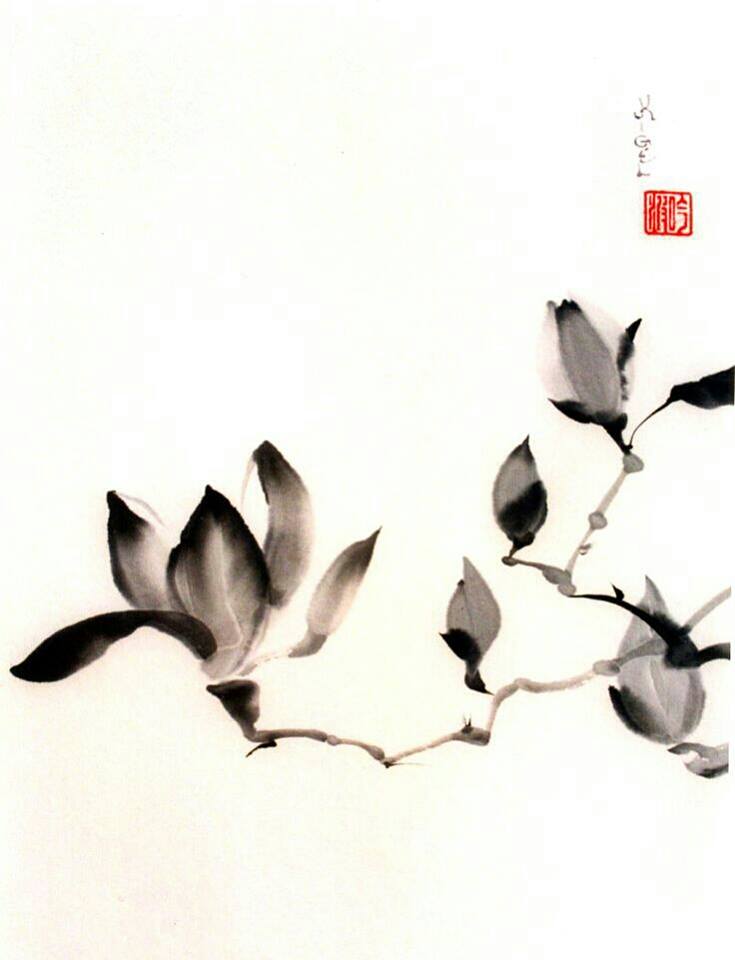
Lastly, I want to also say that metta can lead to insight as well. It is not only a “feel-good” factor and a samadhi practice. Metta is also a practice that engenders a lot of wisdom and there are various ways that this is discussed in the suttas. The main way is that samadhi does help us to see things as they really are, because those hindrances are not distorting the truth and the mind is “soft.” The Buddha said when you have purified from the hindrances, the mind is malleable, soft and fit for work, which means you can direct it into any area of experience that you wish to. The analogy he makes is like melting gold. The gold at first is full of these impurities, these five hindrances i.e., other types of metal: lead, tin, copper, etc. So, you melt down that gold and remove the impurities and at that point when the gold is molten, soft, you can make anything you want out of that gold. In the suttas it says that at this point, you can direct the mind towards impermanence, suffering and non-self; you might choose to direct your mind towards past lives – and I know plenty of people who have done that, so this is something real. There is also the possibility to direct the mind towards beings arising and passing and notice that beings come into existence and pass away due to causes, so we get insight here into the Four Noble Truths – into causality, dependent arising. This is obviously a very high stage of practice and I can’t claim to be doing those things myself or not doing some of those things anyway.
But there are other reasons that metta can lead to wisdom, and one is that we learn that letting go leads to joy. The more we can let go, the more we can get out of the way, the more joy starts to arise, because metta is a less conditioned state than the states of aversion and clinging. The states of aversion and clinging always revolve around someone wanting something or not wanting something, so they tend to be very solidified states where there is a very strong sense of self involved: “I want; I don’t want.” But when those hindrances start to be overcome, the sense of self starts to dissolve. You are not so solid anymore. People can come and say things to you that might normally upset you and you just shrug and say, “never mind.” Or you could even laugh and say: “That’s true, I do have that tendency!” and that is OK, if you’re really at ease with yourself. It is OK – you can admit it as well.
So, letting go leads to joy and metta is less fabricated. Then after spreading metta the Buddha says in one sutta in the Majjhima Nikaya, that the best thing to do is to contemplate the five khandas as suffering, affliction, and alien- the aspect of “not mine.” They are disintegrating, which is related to impermanence; they are empty and non-self. I think it is particularly important to note the order here – that it is after spreading metta you can do that. Your mind is already resourced, it is already at ease – if you like there is some cushioning in the mind – so you that you are not going to be broken by these realisations; if anything, it’s going to lead to further letting go, peace and release.
The last thing I found in the suttas, where the Buddha talks about insight arising through metta, is that you can see even the states of metta themselves as conditioned and volitionally produced. So, although they are less conditioned than states of suffering and aversion – states where the five hindrances are involved – they still in are conditioned realm, they are still “an abiding,” they are still planes of existence. The Buddha says that at that time we can reflect that they are volitionally produced and therefore it is not the end of the Path, yet! There is yet something more to be discovered. In Buddhism we are always digging deeper, digging deeper, all the time.
I wanted to practice some metta with you and just go over very briefly how it is normally done. Generally speaking, we start metta practice using thought – a discursive method – we choose some phrases that resonate for us, which capture our well-wishing towards ourselves or another person. I could offer you some or you could find some other ones for yourself. I usually choose positive words rather than “free from suffering” or “free from fear” because all words have an energy and I think the mind knows. If you say the word “content” or “happy”, it just tends to – for me anyway – incline my mind in a slightly more wholesome way. So, I usually say: “May I be happy, may I be free” (that implies from suffering) – “May I be healed” – to me that means mentally and physical – and “May I be at peace.” I like the sound of those words because they rhyme as well, and it’s become – not like a mantra – but something that my mind instantly recognises: “Oh! Now she is practicing metta!” It is nice when you have something that works for you, something that you bring up and your mind makes an association with and finds a slightly quicker way in. You do not have to have four, it is up to you. You might just want: “May I be happy, may I be peaceful, may I be liberated,” or something similar. One teacher that I know, Bhante Sujato, he just uses: “May I be happy,” that is all: “May I be happy, may I be happy, may I be happy…” …and he has been using that for nearly thirty years; that is his main practice.
So, it starts in that discursive way, but the point is not the words, the point is where those words are leading to, it is the meaning behind those words. We make a pause between each phrase and we just allow the meaning, allow the vibration of those words to resonate as though inviting the mind to follow in that direction – not intentionally, but just wait and see, just listen in to your heart. How does that feel? You are keeping connected to your body and then you put in the next phrase and you listen, put in the next phrase, so you are engaging with the phrases. It is not happening automatically – you are not becoming disconnected from the meaning of those words. You are staying embodied and you may notice over time if the mind starts to calm down, that you need to say these phrases less often, there might be bigger gaps between the phrases, or even you might move towards just a single phrase or word. You do not have to [reduce the words] if it works for you to carry on repeating those phrases, but if it starts to feel like too much effort, too much talking within, just drop it down a bit or keep more silence in between.
So, there is the element of the words, the aspect of the feeling in your heart or in your body, keeping aware of whatever arises, and then the third aspect is the person who you are generating loving kindness towards. If it is yourself, it is sometimes harder to visualise yourself and you do not really need to, but you can inwardly smile at yourself. If it is a loved person – and I want to practice with the loved person today – then we bring up their face or a sense of their energy in front of us or around us, it depends on whether you are visual. Some people are very visual, you can easily see a person’s face – you do not have to hold all the features really clearly in mind but just to have a sense that that person is the object of your metta. If you cannot visualise easily, just bring to mind that person’s presence, how you feel around that person, a general sense of who they are. You are repeating these phrases, you are connected to your body and you are also seeing or feeling that person.
You use their name for example: “May Alison be happy; may Alison be free” or whoever it is. And imagining them receiving, treat it like a real thing that is happening between you both, because it is incredible how these qualities of loving kindness can spread beyond what we understand as this physical world that we experience right now with our senses. Metta has a powerful effect. My first teacher and preceptor in Burma had such powerful metta – I used to know when he was sending me metta – it had a certain quality to it that I became very familiar with and it was very clearly his metta. That was tested out by my fellow nun at the time because once when he was away from the monastery for several days. We were both sitting incredibly long hours in those days, for four or five hours at a stretch, before coming out of meditation. This one time, I said to her: “About halfway through that did you feel something?” and she replied: “Yes I felt Sayadaw’s metta.” I said: “Yes, I think he came back that time,” and of course, he did. Metta is powerful, and we practice step by step.
So, shall we practice some metta for half an hour or so? And if it does not work for you, please do not worry, just relax the words, relax the effort and keep making peace with whatever arises in your body and mind. Sometimes the opposite of metta can arise because we encounter blockages to metta; we contact our irritation, frustration, even our anger towards that person. If that happens do not worry – just turn your metta towards the anger, towards the frustration and towards yourself, OK? Remember that we are widening the boundary of what we can accept, of what we can let into our heart.
Anukampa Events SEE LATEST >

